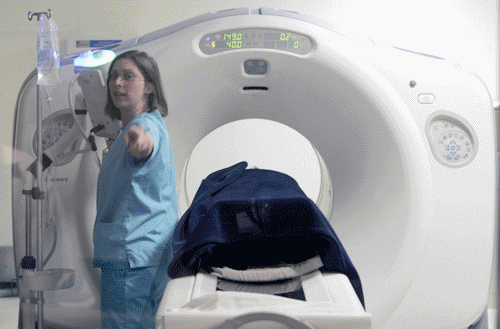Home | Site Map | Contact Us |  MEMBERS AREA MEMBERS AREA |
|
|
 |
 |
|
 |
 |
Press Releases
An Alarming Retreat On Early Detection by Dr. Alan Kaye

With Medicare reimbursement rates being cut for diagnostic imaging, some doctors are worried that access to tests such as CT scans will be reduced. (Associated Press)
Physicians and our patients were stunned this week by suggestions for new mammography guidelines announced by a government health panel. The guidelines from the U.S. Preventive Services Task Force recommend that women ages 40 to 49 forego screening for breast cancer with a mammogram, and that women in their 50s seek screening just every two years.
This is a dramatic reversal of gold-standard recommendations championed by the American Cancer Society that are based upon solid scientific evidence. Large, multinational research studies have shown that mammography saves lives in all age groups covered by the current guidelines. The death rate from breast cancer has plummeted by 30 percent since these guidelines became standard.
Despite the confusing signal to women, strong statements by the American Cancer Society and American College of Radiology laid to rest any concerns that insurance companies will use these guidelines as a basis for denying coverage for thousands of women who might benefit from mammograms. Thanks to the outcry from the scientific community and the public, I am confident that this will not happen in this situation, but I am concerned about what seems to be a prevailing bias to deny access to care in the name of health reform and "science."
Pointing to recommendations by this same task force, the Medicare agency announced a new policy of non-coverage for CT colonography (also called virtual colonoscopy) despite solid evidence of its effectiveness in detecting colon cancer early, when it is most treatable.
In an era when we encourage preventive medicine and cajole Americans to get the proper screenings that find disease early, saving lives and money, it is counterintuitive to erect more barriers to diagnostic services. This is particularly troublesome here in Connecticut, which nationally, from 2000-2004, had the third-highest rate of new breast cancers, the 13th highest rate of new colorectal cancers in men and the 11th highest rate of new colorectal cancers in women.
Unfortunately, these new recommendations are just the latest in a string of blows to vital services. Steep Medicare cuts proposed by Congress and the Obama administration will threaten patient access to diagnostic imaging services. Although proposed cuts are specific to Medicare reimbursements, we will have to resist the attempts of private insurers to follow suit, compounding a potential widespread reduction in access to these important tests. These deep and arbitrary cuts would cause congestion and delays at the hospitals and centers still able to provide imaging services. Physicians would be forced to pull back services in their communities or close their centers.
On top of these proposals, the 2010 Physician Fee schedule that the Medicare agency published last month will further pressure doctors to scale back or discontinue medical imaging services. The new payment schedule will reduce payments to non-hospital practices by 48 percent for pelvis CT, 46 percent for MRI of the chest and 27 percent for cardiovascular-related services.
To make matters even worse, Congress and the administration have proposed an onerous excise tax on new medical equipment that would include imaging machines. By dramatically increasing the costs of new equipment through a tax, Congress and the administration will inhibit the surviving imaging centers from upgrading their equipment and providing their patients with the highest quality care available.
Advanced radiology tools including MRIs and CT scans and more basic screenings such as mammography are some of our most potent weapons against the most dangerous and costly diseases. Congress and the administration must thoroughly examine the unintended consequences of proposals that weaken preventive care and instead ensure all patients have access to the right scan at the right time.
•Dr. Alan Kaye is chairman of the Department of Radiology at Bridgeport Hospital, his specialties include CT scanning, ultrasound and MRI. He is a councilor of the American College of Radiology and president of Advanced Radiology Consultants, based in Trumbull.
Copyright © 2009, The Hartford Courant
12/15/2009
|
 |
Know someone who would enjoy this article?
Email it to them Now! |
|
|
Return to the main press release area.
|
|
|
 |
|
|
 |
|
|
 |
|
 |
|